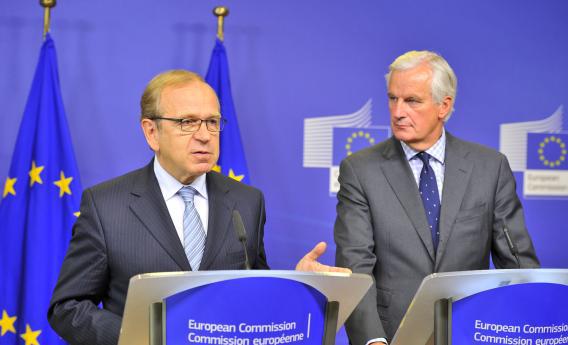Bankers should eat their own stew at bonus time. The European Union’s Liikanen review says managers should receive part of their compensation in the form of their own banks’ “bail-in” bonds. Since such debt would plummet if the bank needed a rescue, it would make bosses more alive to the risks their institutions are running.
Bail-in bonds are an important idea in their own right for helping prevent and manage banking crises. Buyers of this subordinated debt would know in advance that they would have to take a hit if the bank ran into trouble. The bondholders would have an incentive to police the issuers to make sure they didn’t take excessive risks. If they still did, the banks would have bigger buffers to absorb the shock - reducing the chance that taxpayers might have to ride to their rescue.
Requiring bank bosses to take some of their pay in this type of instrument would further sharpen the incentive. Managers wouldn’t just be less tempted to repeat the high-risk strategies of the credit bubble, such as mega-acquisitions or leveraging themselves to the eyeballs; they would also be more inclined to police intensively the behaviour of their underlings, who have sometimes caused havoc with rogue trading schemes.
Bail-in debt has different incentive properties from shares. Equity can soar in value, as well as plummet. Managers stuffed with shares can therefore try to shoot the lights out, without worrying too much about the downside.
Some argue that paying bankers with bail-in bonds could make them too risk-averse - and so, for example, refuse to lend in a downturn. But nobody is suggesting that financiers should be paid solely in such debt. A balanced diet would include equity as well as bail-in debt.
Erkki Liikanen, the Bank of Finland governor, isn’t the first person to suggest such a scheme. Lloyds and RBS both paid their bankers in subordinated debt in 2009. Some other central bankers and pundits have also advocated something similar. But Liikanen’s review has now put the idea firmly on the table for the European Union. Governments should run with it.
Read more at Reuters Breakingviews.
